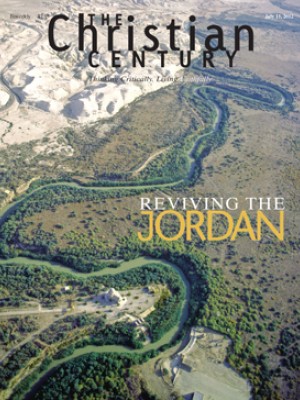Catholic theologians stand up to the Vatican
Over the past 50 years, the practice of thinking theologically in the Roman Catholic Church has slowly shifted from a practical craft to train the next generation of clerics to a wider field of study that employs perspectives from across the scholarly spectrum.
As Catholic theology has branched out, bishops—who have the ultimate teaching authority in the church—have struggled to curb theological thinking they consider a potential source of confusion for the lay faithful. As a result, in recent years the bishops have criticized the work of a number of prestigious American theologians.
Read our latest issue or browse back issues.
In St. Louis, members of the Catholic Theological Society of America spoke against the Vatican’s recent denunciation of Sister Margaret Farley’s 2006 book, Just Love: A Framework for Christian Sexual Ethics, in which the bishops found “grave problems.” We must “learn to say ‘stop’ to those who abuse authority only to preserve it,” William O’Neill, of the Jesuit School of Theology at Berkeley, told assembled scholars.
On June 4, the Vatican’s orthodoxy watchdog office, the Congregation for the Doctrine of the Faith, released a five-page “notification” about Farley’s book, saying her writing on sexual ethics did not conform to the teachings of the magisterium, the church’s teaching authority through the pope and bishops. Pope Benedict XVI had approved the notification March 16.
“Sister Farley either ignores the constant teaching of the Magisterium or, where it is occasionally mentioned, treats it as one opinion among others,” the notification said. It declared the book could not be used “either in counseling and formation, or in ecumenical and interreligious dialogue.”
On June 7, the board of the Catholic Theological Society of America issued a statement supporting Farley, a past president of the group and a professor emerita at Yale Divinity School. The board said her work “has prompted a generation of theologians to think more deeply about the Christian meaning of personal relationships and the divine life of love that truly animates them.”
The statement acknowledged, as Farley did in her own statement, that Just Love contained ideas that were contrary to church teaching. But, it said, Farley’s purpose was to “explore questions of keen concern” to Catholics, which “is one very legitimate way of engaging in theological inquiry that has been practiced throughout the Catholic tradition.”
The wider CTSA membership agreed with the board, later approving a motion to endorse the statement.
Last year, the group responded similarly after the doctrine committee of the U.S. Conference of Catholic Bishops criticized the work of another theologian, Sister Elizabeth Johnson, a professor at Fordham University.
John Thiel, a professor of religious studies at Fairfield University and the CTSA’s president, said that while Catholic theologians take the teachings of the church seriously, their role is not simply to repeat those official teachings.
“Sometimes Catholic theologians raise questions about that teaching and offer perspectives and new understandings of what the church’s teachings might one day be,” he said.
Robert Schreiter, a professor at Catholic Theological Union in Chicago, said Farley is the victim of a Vatican culture of control over the very nature of religious thinking. “The issue is about understanding different dimensions of theology,” he said. “Rome is berating Margaret for not doing the kind of theology they want done.”
Peter Phan, a Georgetown University theology professor whose work also has been investigated by the bishops, said Just Love is about Christian social ethics. “Margaret spent her career teaching at Yale, in an ecumenical context,” he said. “Her duty as a theologian is to expand, not simply repeat.”
At a session organized to discuss the Vatican notification, Farley spoke publicly about it for the first time, telling hundreds of her colleagues that the previous week had been the culmination of a three and a half year debate with the Congregation for the Doctrine of the Faith—a conversation that had taken place entirely through the president of her order, the Sisters of Mercy, she said.
“The judgment was that the book was not consistent with valid expressions of Catholic theology,” Farley said, “which implies that anything I write ought to be about that.”
The Vatican said “among the many errors and ambiguities” of her book were “its positions on masturbation, homosexual acts, homosexual unions, the indissolubility of marriage and the problem of divorce and remarriage.”
“There are terribly important questions, and other than to say that I have a defective knowledge of natural law, these were not addressed,” Farley said. A “profoundly important” question for Catholic theologians, Farley said, is: “Should power settle questions of truth?”
In its notification, the Vatican said its original purpose for investigating Just Love was because “doctrinal errors” in it are “a cause of confusion among the faithful.”
But Richard Gaillardetz, a theology professor at Boston College, said the bishops’ use of the phrase “confusion of the faithful” was “infuriating” and “an ongoing problem we see in these statements.”
Throughout her career at Yale, Farley developed a knack for finding herself in the middle of theological controversy, she said. Her students asked her all the time why she stayed in a church that so often pushed back against her work.
Because the church “is still a source of real life for me,” she would tell them. “It’s worth the struggle. It’s worth getting a real backbone that has compassion tied to it.” —St. Louis Post-Dispatch





